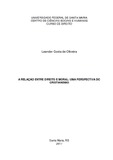| dc.contributor.advisor | Espindola, Angela Araujo da Silveira | |
| dc.creator | Oliveira, Leander Costa de | |
| dc.date.accessioned | 2017-08-25T16:07:54Z | |
| dc.date.available | 2017-08-25T16:07:54Z | |
| dc.date.issued | 2017-07-12 | |
| dc.date.submitted | 2017 | |
| dc.identifier.uri | http://repositorio.ufsm.br/handle/1/11574 | |
| dc.description | Trabalho de conclusão de curso (graduação) - Universidade Federal de Santa Maria, Centro de Ciências Sociais e Humanas, Curso de Direito, RS, 2017. | por |
| dc.description.abstract | The objective of this paper is to analyse the relation that exists between Law and morality, from the christian and biblical understanding of the subject. This is so that the legal operators and scholars have a source of knowledge of high relevance for contemporary society. Some of the major world views on morality will be briefly presented, for the morals are the main point for the progress of the study. It is presented how these forms of reading of the universe provide the moral dilemmas that exist in the modality of democracy of Brazil. Afterwards, the foundation of morality for Christianity, which is the very nature of God, will be presented. This is the central point of the research, because the foundation of morality defines its relation to Law, and it is also the great difference of the christian vision to the others. In a third moment, the relationship between the kingdom of men (here included Law) and the kingdom of God (which involves heavenly things), between civil law and divine law, and what should be the position of the legal professional in this context. The method of approach used was the dialectic, based on the use of bibliographical research, in order to present the most important premises of different ways of understanding the subject, with the opinion of philosophers, jurists and theologians. It was concluded at the end of the research that, in essence, moral and Law belong to separate spheres in their basic structure, and are independent, the first being related to the spiritual world and the eternal and immutable divine law, and the second with the form of temporary organization of men and women in community. And, furthermore, christian morality may be the best source of guidance for Law, so that it can be greatly benefited by it. | eng |
| dc.language | por | por |
| dc.publisher | Universidade Federal de Santa Maria | por |
| dc.rights | Acesso Aberto | por |
| dc.subject | Direito e moralidade | por |
| dc.subject | Moral cristã | por |
| dc.subject | Relação entre moral cristã e direito | por |
| dc.subject | Law and morality | eng |
| dc.subject | Christian moral | eng |
| dc.subject | Relation between christian moral and law | eng |
| dc.title | A relação entre direito e moral: uma perspectiva do cristianismo | por |
| dc.title.alternative | The relation between law and morality: a perspective of christianity | eng |
| dc.type | Trabalho de Conclusão de Curso de Graduação | por |
| dc.degree.local | Santa Maria, RS, Brasil | por |
| dc.degree.graduation | Direito | por |
| dc.description.resumo | O presente trabalho tem o objetivo de analisar a relação que existe entre Direito e
moralidade, a partir do entendimento cristão e bíblico do assunto. Isso para que o
operador jurídico e o teórico tenham uma fonte de conhecimento de alta relevância
para a sociedade contemporânea. Serão apresentadas brevemente algumas das
principais cosmovisões acerca da moralidade, ponto principal para o deslinde do
estudo. É apresentado como essas formas de leitura do universo proporcionam os
dilemas morais que existem na modalidade de democracia do Brasil. Após, será
apresentado o fundamento da moral para o Cristianismo, que é a própria natureza
de Deus. Este é o ponto central da pesquisa, porque o fundamento da moralidade
define sua relação com o Direito, e também é o grande diferencial da visão cristã em
relação às outras. Num terceiro momento, analisa-se a relação que deve existir, ou
não, entre o reino dos homens (aqui incluído o Direito) e o reino de Deus (que
envolve as coisas celestiais), entre a lei civil e a lei divina e qual deve ser a postura
do profissional do Direito nesse contexto. O método de abordagem utilizado foi o
dialético, a partir do uso de pesquisa bibliográfica, a fim de apresentar as premissas
mais importantes de diferentes formas de entender o assunto, com a opinião de
filósofos, juristas e teólogos. Concluiu-se, ao final da pesquisa, que em essência
moral e Direito pertencem a esferas separadas na sua estrutura básica, e são
independentes, estando a primeira relacionada com o mundo espiritual e a lei divina
eterna e imutável, e o segundo com a forma de organização temporária dos homens
e mulheres em comunidade. E, além disso, a moral cristã pode ser a melhor fonte de
orientação para o Direito, de tal forma que este pode ser grandemente beneficiado
por ela. | por |
| dc.publisher.country | Brasil | por |
| dc.publisher.initials | UFSM | por |
| dc.subject.cnpq | CNPQ::CIENCIAS SOCIAIS APLICADAS::DIREITO | por |
| dc.publisher.unidade | Centro de Ciências Sociais e Humanas | por |


